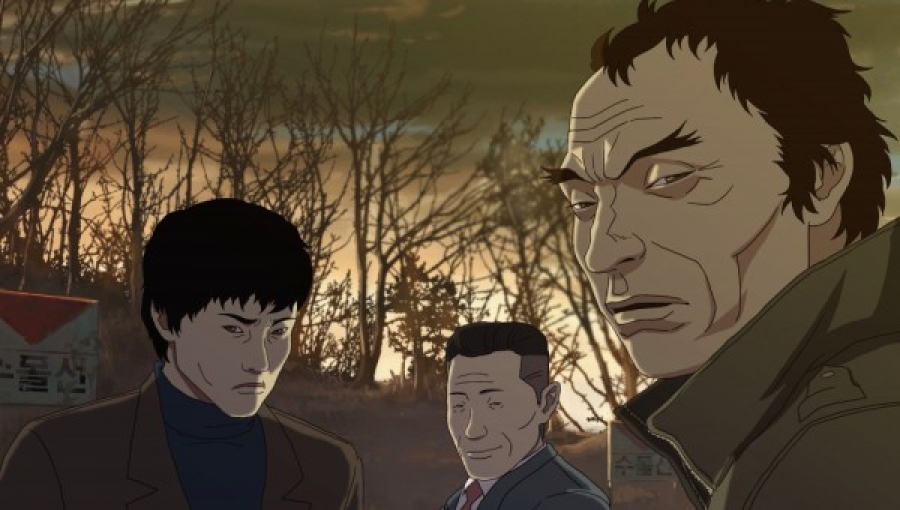The Fake is a dark, disturbing, and nihilistic animated tale from South Korean animator/writer/director Yeon Sang-ho. The story centers on a village that is going to be flooded due to a dam construction and is seeking solace in a church set up by a con man looking to drain the villagers of their savings before moving on to the next scam. Everyone is living in a blissfully ignorant religious fervor, until Min-Chul comes back into town and starts to make trouble and tries to blow everything to hell. But, Min-Chul is no hero. He is profoundly foulmouthed, a violent drunk, a horrible misogynist, an abusive husband and father, and an all-around abrasive and unlikeable person. He truly has no redeeming qualities. After an altercation with the con man at a bar in the city, Min-Chul ends up at the police station where he sees a wanted poster for the con man, and so when he later sees him at the church, he calls him out as being a fraud, and sets in play a chain of events that can have no positive outcome.
Every character in this story is complex, from the hardened, loveless Min-Chul to his daughter, who hates him for ruining her life, to the pastor of the church, who actually believes in what he is doing, turning an oblivious eye to the sham that is providing him with his resources. The only character that is not complex is the con man, because he is nothing more than a straight lie. The pastor, it turns out, is harboring some dark secrets of his own, and as Min-Chul drags more and more out into the light through sheer force of will and abject violence, events begin to spiral out of control, and people become pawns as belief and truth are distorted for personal gain. The Fake is not an anti-religious film, rather it is about truth and deception. Yeon Sang-ho uses religion as a thing that, when misused, can be incredibly destructive.
This film is not for the faint of heart, as it deals with death, fate, deception, redemption, and has absolutely no hero. The climax of the film is powerful, Min-Chul finally pushing the pastor to the edge, and it plays out in a stunningly cinematic style that is markedly tragic, but also exciting. For me, the animation was somewhat rough, with an almost rotoscoped feel to it, but I believe the style perfectly fits with this tragic story full of ugly, angry, deceptive, and misled people. But, The Fake raises a very thought-provoking question, and that is, “If the source of where you hear the truth is false, then can the truth still be true to you, and is that truth still real?” This question is discussed in the film in probably one of the few tender, gentle moments, but Min-Chul is too blinded by his anger to even stop and think about any possible good coming from the situation. The Fake paints a very bleak, moralless landscape that there is no escaping from, because if you buy into the lie, then you may be happy, but at what cost? If you refuse the lie, then everyone shuns you, but is knowing the truth enough to make you happy?

